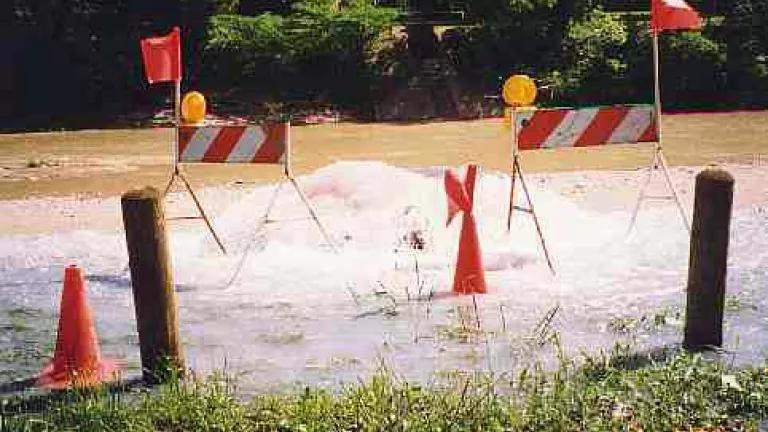
This post was co-written with my colleague, Steve Fleischli
Ladies and gentlemen, we have an early entry in this year’s contest to see which member of Congress will do the most to attack protections for the nation's water. Rep. Harold Rogers (R-KY), Chairman of the House Appropriations Committee, announced Wednesday that he would move to slash the budget for the remainder of this fiscal year for the Environmental Protection Agency, and promised to take a particularly big axe to programs that help keep our waterways clean and help ensure that our drinking water is safe for our families.
Of the specific cuts Mr. Rogers (whose neighbor I do not think I would like to be, based on this effort) pledged to make, nearly a billion dollars -- $950 million to be exact -- would come from the Clean Water and Safe Drinking Water State Revolving Funds, which EPA provides to states to help finance projects that handle and treat domestic sewage and stormwater and that deliver drinking water to homes and businesses. Cutting these investments in communities makes no sense. The nation’s water infrastructure needs are hundreds of billions of dollars greater than the funding we provide to ensure these services continue, and cutting the revolving funds will only worsen that debt. So, the next time there’s a water main break in your community, or a sewage leak into a friend or family member’s basement, think of Representative Rogers’s proposal.

But even if one were to ignore the threats to public health and the environment that Mr. Rogers’s cuts to the revolving funds represent (something we would do at our peril), these rollbacks are bad news for our struggling economy. Infrastructure investments create jobs and have a positive impact on the economy well beyond the amount spent (called the “multiplier” effect).
On top of these disastrous disinvestments in water infrastructure, Rep. Rogers announced that he would take back $1.6 billion from EPA’s overall budget. There’s no telling – at least yet – exactly which programs this would weaken and by how much. However, as my colleague Scott Slesinger explains, it’s probably a safe bet that the agency’s implementation and enforcement of our fundamental environmental laws would take a tough hit. That’s bad news when you think about the already tenuous state of water programs, a problem highlighted in a New York Times series a little over a year ago.
I worry what kinds of polluters will avoid oversight because of these cuts. For instance, two of EPA’s national enforcement initiatives for fiscal years 2011-13 are “[k]eeping raw sewage and contaminated stormwater out of our nation’s waters” and “[p]reventing animal waste from contaminating surface and ground waters.” Those seem like pretty good ideas. If Mr. Rogers has his way, how many fewer industrial livestock facilities will EPA be able to inspect and ensure they are properly handling their huge volumes of waste? Likewise, will Mr. Rogers cut EPA’s capacity to enforce the Clean Water Act to reduce sewage overflows into the nation’s waters?
I also worry that massive cuts to EPA’s budget would mean reductions in the grants EPA provides to states for beach water monitoring and public notification programs. As NRDC’s 20th annual “Testing the Waters” report noted last summer, these programs are already under-funded and need to provide more comprehensive and real-time data. But further weakening state programs by starving their funding risks public health; monitoring and notification initiatives help warn beachgoers about bacterial pollution from human and animal waste that can cause a variety of illnesses.
As if all of this weren’t enough, the proposed budget cuts also could undermine pro-active regulatory programs by underfunding them (for all I know, that may well be Mr. Rogers’s intention). So, EPA's work to rein in pollution from mountaintop removal coal mining, its plan to clean up the Chesapeake Bay, or its long-overdue initiative to overhaul its rules governing runoff pollution all could be jeopardized by a lack of funds to carry out this much needed work.
It’s sad that Mr. Rogers seems determined to gut programs that keep us from getting sick and that protect waterways so that we can safely fish, swim, and boat. Congress should reject radical proposals like this, which would cut the resources EPA scientists and law enforcement officials need to do their jobs and the funds on which state clean water programs rely.

